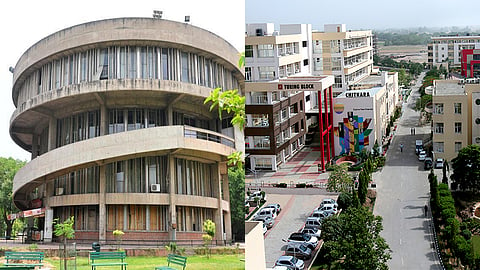

In a proud moment for the region’s academic institutions, Panjab University (PU) and Chitkara University have maintained their global standing in the Times Higher Education (THE) World University Rankings 2026, securing positions in the 601–800 band among over 2,000 universities evaluated worldwide.
"The consistent performance of both universities underscores their steady growth in research output, teaching standards, and global outreach at a time when the competition among universities has intensified across 115 countries", said education experts.
For Panjab University, this year’s ranking reaffirms its momentum in international recognition. The university, which made a breakthrough from the 801–1000 band to the 601–800 range two years ago, has now consolidated its place there. University officials attributed this progress to a focused approach on research collaborations, faculty development, and academic innovation.
PU’s Vice Chancellor Prof Renu Vig, addressing the media said that the latest ranking validated the university’s ongoing academic reforms and its commitment to excellence. “We have made conscious efforts to enhance research visibility and quality teaching. The results are encouraging and motivate us to work toward further improving our global position,” she said.
PU recorded gains in several key parameters assessed by Times Higher Education, including teaching quality, research environment, and industry engagement. The university’s growing research output and improved citation impact have also contributed to its stronger global footprint. PU continues to be one of the few state public universities from India to consistently feature in the top 800 category internationally.
Chitkara University, which shares the same 601–800 bracket this year, has also made notable progress, particularly in research quality and international collaboration. The university’s emphasis on innovation-led education and its growing engagement with industry partners have been recognized in the rankings.
Pro-Chancellor Dr Madhu Chitkara said the university’s inclusion reflects its long-term strategy to balance academic learning with real-world exposure. “This achievement mirrors our commitment to global competitiveness and research-driven education. It is a milestone that inspires us to keep pushing boundaries,” she said.
Education experts say the consistent showing by PU and Chitkara represents a shift in how northern Indian universities are being perceived globally. Both institutions have worked on improving their research citations, diversifying international faculty, and creating stronger academic-industry linkages.
Meanwhile, Thapar Institute of Engineering and Technology has also featured in the same band, reinforcing Punjab’s growing presence in the international higher education space. In contrast, IIT Ropar was placed in the 1001–2000 range this year — a decline from its earlier standing.
The Times Higher Education World University Rankings 2026 evaluated universities on 18 performance indicators grouped under teaching, research quality, research environment, international outlook, and industry engagement. This year’s expanded assessment made competition stiffer than ever, with more global institutions entering the fray.